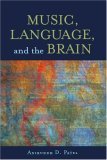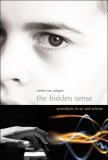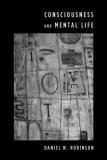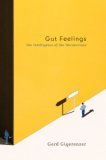November 6, 2007
I like to browse…

Music, Language, and the Brain is due to be released tomorrow (Nov. 7) from Oxford University Press.
is due to be released tomorrow (Nov. 7) from Oxford University Press.
“In the first comprehensive study of the relationship between music and language from the standpoint of cognitive neuroscience, Aniruddh D. Patel (Senior Fellow, The Neurosciences Institute, San Diego) challenges the widespread belief that music and language are processed independently.”
The Hidden Sense: Synesthesia in Art and Science (Leonardo Books),
 is new from MIT Press: “In The Hidden Sense, Cretien van Campen explores synesthesia from both artistic and scientific perspectives, looking at accounts of individual experiences, examples of synesthesia in visual art, music, and literature, and recent neurological research.”
is new from MIT Press: “In The Hidden Sense, Cretien van Campen explores synesthesia from both artistic and scientific perspectives, looking at accounts of individual experiences, examples of synesthesia in visual art, music, and literature, and recent neurological research.”
 Consciousness and Mental Life
Consciousness and Mental Life by Daniel N. Robinson is due out on Nov. 16.
by Daniel N. Robinson is due out on Nov. 16.
Comments (0)
- cognitive science,consciousness,new books
November 4, 2007
Wikipedia on the “conjunction fallacy”:
The conjunction fallacy is a logical fallacy that occurs when it is assumed that specific conditions are more probable than a single general one.
The most oft-cited example of this fallacy originated with Amos Tversky and Daniel Kahneman:
- Linda is 31 years old, single, outspoken, and very bright. She majored in philosophy. As a student, she was deeply concerned with issues of discrimination and social justice, and also participated in anti-nuclear demonstrations.
- Which is more likely?
- Linda is a bank teller.
- Linda is a bank teller and is active in the feminist movement.
85% of those asked chose option 2. However, mathematically, the probability of two events occurring together (in “conjunction”) will always be less than or equal to the probability of either one occurring alone.
 In Gut Feelings: The Intelligence of the Unconscious, researcher Gerd Gigerenzer (director at the Max Planck Institute for Human Development) criticizes this view of the conjunction fallacy, suggesting that the problem plays on ambiguities in the meaning of probable and and. When rephrased in numerical terms (ie, out of a 100 persons who fit the description above, how many are (a) bank tellers or (b) bank tellers and active in the feminist movement?) the fallacy disappears, as the number assigned to (a) is larger than the number for (b). (p. 93-97)
In Gut Feelings: The Intelligence of the Unconscious, researcher Gerd Gigerenzer (director at the Max Planck Institute for Human Development) criticizes this view of the conjunction fallacy, suggesting that the problem plays on ambiguities in the meaning of probable and and. When rephrased in numerical terms (ie, out of a 100 persons who fit the description above, how many are (a) bank tellers or (b) bank tellers and active in the feminist movement?) the fallacy disappears, as the number assigned to (a) is larger than the number for (b). (p. 93-97)
For further reading, the European Rationalist has posted “Reason and Rationality” an in-depth article by Richard Samuels, Stephen Stich and Luc Faucher that evaluates “the nature and plausibility of the pessimistic view of human rationality often associated with the heuristics and biases tradition.”
“Linda the bank teller” is also discussed at “Overcoming Bias.”
Comments (0)
- cognitive science,psychology
November 3, 2007
I’m a fan of both TED.com and LibraryThing. Now TEDBlog has just announced that the TED Book Club has been put into LibraryThing, so their picks are available for browsing here, 61 titles so far…
Also on TED, the latest talk posted is Buddhist monk and author Matthieu Ricard speaking about “Habits of happiness.”
books by Matthieu Ricard at Amazon
Comments (0)
- happiness
is due to be released tomorrow (Nov. 7) from Oxford University Press.
 is new from MIT Press: “In The Hidden Sense, Cretien van Campen explores synesthesia from both artistic and scientific perspectives, looking at accounts of individual experiences, examples of synesthesia in visual art, music, and literature, and recent neurological research.”
is new from MIT Press: “In The Hidden Sense, Cretien van Campen explores synesthesia from both artistic and scientific perspectives, looking at accounts of individual experiences, examples of synesthesia in visual art, music, and literature, and recent neurological research.” Consciousness and Mental Life
Consciousness and Mental Life by Daniel N. Robinson is due out on Nov. 16.




